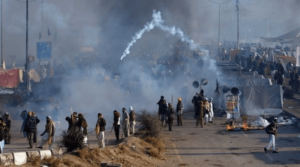The issue of missing persons in Pakistan is a contentious matter, often portrayed as a Human Rights Violation (HRV) and used as an anti-state narrative by both kin and liberal segments of the society. These people disappear without any information, leaving their relatives to wonder about their whereabouts. Suspicions frequently point to extrajudicial acts by law enforcement (LEAs). Many of the missing persons come from unstable areas, especially in provinces where crime and insurgencies are common. This has led to claims that the state is complicit in the disappearances of these people.
Human rights advocates and bereaved families often exaggerate these charges, which feeds public distrust and hatred against the government. Investigations have shown, however, that a large number of people classified as “Missing Persons” have voluntarily joined terrorist groups like the Tehrik-i-Taliban Pakistan (TTP), Al Qaeda, ISIS/ISKP or have chosen to go into hiding owing to personal reasons or local disputes. It is crucial to remember, though, that inquiries have shown that a large number of those classified as “Missing Persons” have either voluntarily joined terrorist groups based in Afghanistan and other foreign extremist groups or have chosen to go into hiding as a result of personal reasons or local conflicts.
A significant number of persons who go missing in Pakistan voluntarily join extremist groups.
The reality surrounding missing persons in Pakistan is shrouded in ambiguity, with a blurred line between facts and accusations leading to speculation and defamation, obscuring the truth amidst a haze of partial truths and allegations. A significant number of persons who go missing in Pakistan voluntarily join extremist groups, frequently suffering disastrous outcomes as victims of terrorist acts or being involved in illicit operations discovered by LEAs. Furthermore, a sizeable fraction comprises people who secretly migrate overseas in search of employment possibilities.
Also Read: Missing Persons? Nah, Missing Truth
It is imperative to acknowledge that the matter of missing individuals is not exclusive to Pakistan; instead, it is a worldwide concern. Pakistan has fewer cases of missing individuals than democracies like Germany, India, Sri Lanka, the UK, and the US, which have differing rates of missing persons cases. According to the International Commission on Missing Individuals (ICMP) study, there appears to be a link between a rise in missing individuals and the frequency of conflicts and unfavorable law and order circumstances. Conflict-affected areas like Yugoslavia, Mexico, Sri Lanka, and Iraq are exhibiting this pattern, as seen by the sharp increase in the number of reported missing people.
The origins of the “Missing Persons” problem in Pakistan may be found in the mid-1990s, not too long after the conflict between the Soviet Union and Afghanistan.
The origins of the “Missing Persons” problem in Pakistan may be found in the mid-1990s, not too long after the conflict between the Soviet Union and Afghanistan. Pakistan’s state machinery faced many difficulties during this time, including millions of Afghan refugees being hosted, rising sectarian and ethnic violence, hostile intelligence agencies infiltrating the country, the rise of domestic sub-nationalist groups, and changing security paradigms as a result of 9/11 and the attack on the Indian Parliament in December 2001. The situation was further compounded by operations such as Rah-e-Haq and Zarb-e-Azb along the Pak-Afghanistan border, followed by the Radd-ul-Fasad operation focusing on settled areas. These operations succeeded in the destruction of these terrorist networks, resulting in abettors of the elements resorting to maligning state institutions to further their evil objectives.
This issue is further compounded regarding management by the concerned government quarters. Correct data are absent at the federal or provincial level, which allows inimical forces to exploit this issue. Varying statistics in this regard further ambiguities which serve as fodder for anti-state elements to increase their narratives against state institutions. This also leads to flawed prosecutions and legal issues. Maintenance of data will allow segregation of voluntarily missing persons and forced disappears who are otherwise negligible.
It is also pertinent to mention that numerous commissions were formed occasionally to resolve this issue. These commissions have suggested a comprehensive way forward, but their findings and recommendations were not followed in letter and spirit due to frequently changing governments with their peculiar political interests. The lack of an effective mechanism to counter fictitious propaganda on this issue has been another reason for this issue being projected in a highly exaggerated way.
In several instances following terrorist attacks, individuals listed as missing persons have been discovered as attackers. Numerous additional stories have emerged that explain the complex circumstances surrounding missing people in Balochistan. One noteworthy instance is the identification of Abdul Hameed Dashti, who was once thought to be missing but was later found among one of the terrorists killed in the Awaran district encounter with Police. Many similar cases have emerged recently in Balochistan, where so-called missing persons were found involved in assaulting Security Forces. The stark difference between official claims and affected families’ points of view is exploited by anti-state forces to fulfil their nefarious agenda.
There is no denying the fact that the issue of missing persons is an agonizing phenomenon, and it needs a compassionate but firm address by concerned stakeholders. There is a dire need to devise an effective mechanism to deal with this issue. These measures may include maintaining a database, providing jobs to affected families, evolving a comprehensive counter strategy to offset the effects of negative propaganda against the state and its institutions, and introducing an efficient legal system. These measures will undoubtedly contribute towards mitigating false propaganda of anti-state forces.
This article is for informational purposes only. Find the original publication here.
Omay Aimen is a researcher, with an interest in national security, international politics, hybrid warfare & geopolitics. She can be reached at manahil.jaffer786@gmail.com




